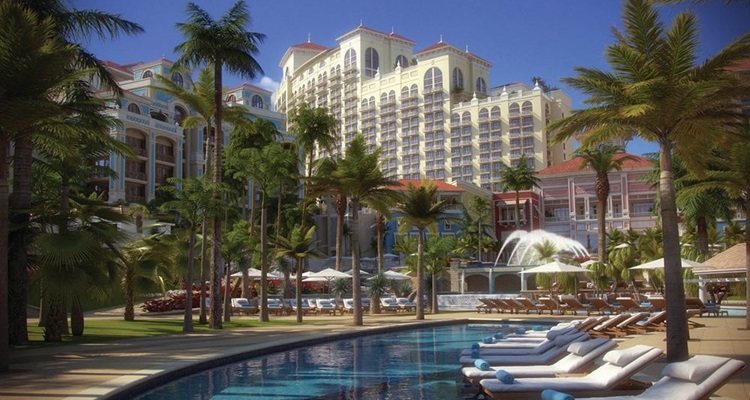In the Bahamas and the recently-opened Baha Mar Casino and Hotel is once again in the news for the wrong reasons after its former developer called on the government of new Prime Minister Hubert Minnis to impose a “moratorium” on the final sale of the $4.2 billion development to Chow Tai Fook Enterprises Limited.
According to a report from The Tribune newspaper, Sarkis Izmirlian also warned that he was considering whether to take legal action against the administration of former Prime Minister Perry Christie over allegations of “state-sponsored discrimination.”
“Place a moratorium on the completion of any sale of Baha Mar [Casino and Hotel] and other transactions under these agreements,” read a letter Izmirlian reportedly sent to Minnis. “Re-open the casino license investigation and report the findings of the Gaming Board [for the Bahamas], given the extensive public record about the associations of Chow Tai Fook Enterprises Limited’s owners; a record that appears to have been intentionally and conveniently ignored under the previous administration.”
The letter from Izmirlian reportedly described the multi-million-dollar tax incentives Christie’s administration granted to Chow Tai Fook Enterprises Limited as “toxic” and “one-sided” before declaring that the Bahamas could not afford this “wholesale giveaway” given its precarious financial situation. It stated that an investigation would enable Minnis’ new government and the people to assess “the toxicity” of the former Christie administration’s dealings with the Chinese firm “and how the best interests of Bahamians can be met.”
Initially, a project of Izmirlian’s BMD Holdings with funding from China Export-Import Bank, the Baha Mar Casino and Hotel was originally scheduled to open for business in 2014 but ran into delays and difficulties that ultimately led to it filing for Chapter 11 bankruptcy protections in a Delaware court in 2015. The developer subsequently blamed these problems on China State Construction Engineering Corporation and its China Construction America Bahamas subsidiary before submitting an unsuccessful offer intended to resurrect the development.
In a move designed to protect the economy of the Bahamas, the Christie administration ultimately liquidated the entire project in October before inking a purchase agreement two months later with Chow Tai Fook Enterprises Limited, which has a presence in global real estate, hospitality, transportation and casino businesses. The Hong Kong-based conglomerate subsequently soft-launched the 1,800-room New Providence Island resort in late-April under the management of its Sky Warrior Bahamas Limited subsidiary and soon hopes to have the development’s 96,875 sq ft casino fully up and running complete with a complement of 1,500 slots as well as some 150 gaming tables.
The Tribune reported that Izmirlian’s letter moreover proclaimed that the deal between the Christie administration and Chow Tai Fook Enterprises Limited had violated the Bahamian constitution and statute law as it allegedly stipulated that the developer and foreign members of his senior management team could not participate in the claims payout process, or, unlike other creditors and tenants, renew existing shop or restaurant leases.
“The heads of terms also underscores the extremes to which the former government of the Bahamas and China Export-Import Bank conspired to impair the economic interests and reputation of the original developer,” read the letter. “Not content to stop at the confiscation of the resort, the heads of terms expressly prohibits any payments to companies associated with Mr Izmirlian, a long-time resident and the largest foreign investor in the history of the Bahamas, as well as payments to the former expatriate executives of Baha Mar [Casino and Hotel]. This is state-sponsored discrimination, contrary to the laws and constitution of the Bahamas, and sets an awful precedent for foreign investment in the Bahamas. Accordingly, BMD [Holdings] is considering its legal options against the parties involved in constructing these highly questionable agreements.”



